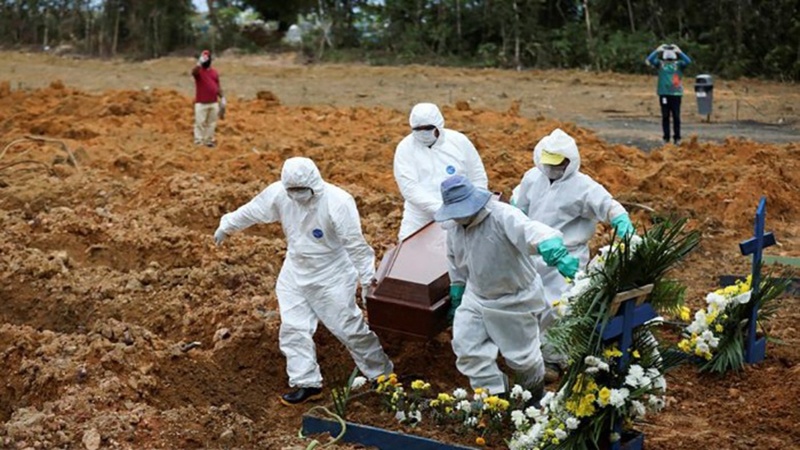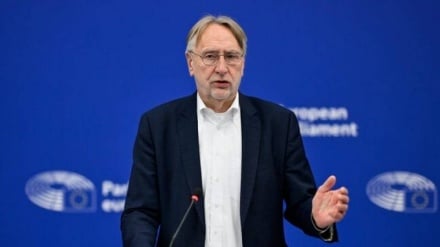Over 4.56 million people have COVID-19 worldwide
More than 4.56 million people are now infected with the new coronavirus across the world, and over 304,000 have died.
According to a running count by worldometers.info, more than 4,566,000 people are infected with the coronavirus.
It also reported that the death toll from COVID-19, the disease caused by the coronavirus, in Europe exceeded 160,000, while its total infections passed 1.7 million.
Spain's death toll marks low increase of 138
Spain's death toll from the coronavirus registered its lowest increase since Monday as health authorities registered 138 new fatalities on Friday, the Spanish Health Ministry reported.
The country's overall death toll rose to 27,459, while the number of diagnosed cases rose to 230,183 cases from 229,540 on Thursday, the ministry said.
Denmark reports zero deaths
Denmark, the first country in Europe to gradually start reopening, reported no coronavirus-related deaths on Friday for the first time since March 13.
Denmark's total number of confirmed cases rose by 78 to 10,791, with the number of hospitalizations falling by 10 to 137. The death toll remained unchanged at 537.
"Milestone today: In the last day we have had 0 deaths as a result of COVID-19 in Denmark," Health Minister Magnus Heunicke said on Twitter.
Russia's caseload exceeds 260K
Russia's coronavirus case tally jumped by 10,598 to hit 262,843 on Friday, cementing its status as the country with the second-highest number of infections after the United States, as the city of Moscow began offering free antibody tests.
Russia's death toll rose by 113 overnight to reach 2,418, the country's coronavirus task force said.
Moscow, the epicenter of the Russian outbreak, started mass antibody testing of residents on Friday to try to work out what portion of the population has already been infected and to identify infected people with no symptoms.
Georgia to end state of emergency
Georgia will end the state of emergency it declared over the new coronavirus on May 22, Prime Minister Giorgi Gakharia said on Friday.
The South Caucasus country of 3.7 million — which has registered 671 cases of the coronavirus and 12 deaths as of Friday — introduced the state of emergency on March 21 and extended it on April 21.
The state of emergency entails a night curfew from 9 pm untill 6 am, the closure of restaurants, cafés, and most shops, a suspension of public transport, and a ban on gatherings of more than three people. Grocery stores, pharmacies, and petrol stations remain open.
The ex-Soviet country has already removed its lockdown of four big cities, including the capital, Tbilisi, and reopened retail and wholesale stores, except those selling clothing and footwear or located in shopping malls.
Bulgaria to cut taxes for restaurants
Bulgaria’s center-right ruling coalition on Friday proposed cutting value added tax (VAT) on food provided by restaurants and catering services to 9% from 20% from July to help an industry hit hard by the coronavirus crisis.
The cut would run through 2021 as a temporary measure to help the sector recover, a draft law before parliament showed, with estimated losses to state finances of 255 million levs (141 million dollars).
Restaurants and cafés were ordered to close in March to combat the virus.
Bulgaria, which has 2,138 confirmed cases of the coronavirus and 102 deaths, has started to ease some restrictions and hopes to attract tourists to its Black Sea resorts after July.
Austria approves resumption of cultural events
Austria’s government said Friday it would allow cultural events for up to 100 spectators from the end of the month as the country continues emerging from its coronavirus lockdown.
The government had come under criticism for failing to present a plan for re-opening the country’s vital cultural sector with its top culture official, Ulrike Lunacek, resigning on Friday.
Shortly after Lunacek’s resignation, Health Minister Rudolf Anschober announced in a hastily-convened press conference that events seating up to 100 people would be allowed from May 29.
The number of spectators permitted will go up to 250 from July 1, when cinemas will also be able to re-open.
From August 1, events for up to 500 people will be allowed, Anschober added.
Larger-scale events of up to 1,000 people may also be allowed from August 1, provided that organizers devise safety measures that receive government approval.
The country of 8.8 million people has recorded more than 16,000 new coronavirus cases and 628 deaths to date.
Germany to loosen quarantine restrictions for some travelers
Germany will loosen coronavirus quarantine rules for travelers arriving from the European Union (EU), the Schengen passport-free zone, and Britain, a spokesman for the Interior Ministry said on Friday.
Authorities will only recommend that travelers go into quarantine if they arrive from countries with elevated numbers of infections.
A mandatory two-week quarantine still applies to travelers from countries outside the EU, the spokesman said.
Norway travel restrictions to remain in place until August 20
Norway will likely maintain the travel restrictions it has imposed until August 20, Prime Minister Erna Solberg said on Friday, as the Nordic country negotiates a path between restarting economic activity and preventing a new wave of coronavirus infections.
The restrictions include official advice against traveling abroad unless necessary, a 10-day quarantine for all people returning from abroad, and barring entry to most non-Norwegians who do not have the right to live and work in Norway.
The government may decide to loosen restrictions imposed on leisure travel between the Nordic countries by June 15, and will consider allowing travelers from other, selected European countries by July 20.
Foreigners working in sectors considered crucial, such as agriculture, fisheries, or the oil industry, are already allowed to come in the country, though they still have to submit to a ten-day quarantine.
Thailand reopening more businesses
Thailand will begin allowing department stores, shopping malls, and other businesses to reopen from Sunday as new coronavirus cases dwindle, the government said.
Stores selling electronics, furniture, and office supplies will be among the businesses allowed to resume work, said Taweesin Wisanuyothin, a spokesman for the government’s Center for COVID-19 Situation Administration.
In Thailand, large stores aside from grocery shops and pharmacies have been closed since late March, when daily cases surged to above 100.
Thailand reported seven new coronavirus cases on Friday, all of which were imported from overseas, while the number of deaths remained unchanged at 56.
Indonesia to impose VAT on digital services
Indonesia will require big internet companies to pay value-added taxes on sales of digital products and services from July as part of efforts to boost revenue amid the coronavirus pandemic, a tax official said on Friday.
The country will impose 10% VAT on digital products sold by non-resident internet companies with significant presence in the Indonesian market, including streaming services, applications and digital games, beginning July 1, according to a Finance Ministry regulation published on the ministry’s website.
Finance Minister Sri Mulyani Indrawati has said that imposing VAT on internet goods was to make sure the government captures the shift in people’s consumption patterns as they stay at home during a lockdown to curb the spread of the virus.
Malaysia reports 36 new cases
Malaysia reported 36 new coronavirus cases on Friday with no additional deaths, the Health Ministry said.
The country has recorded a total of 6,855 infections and 112 fatalities.
Infections, deaths slightly rise in Philippines
The Philippines’ Health Ministry on Friday reported 16 more coronavirus deaths, bringing the total to 806. It also recorded 215 additional infections, increasing the total tally to 12,091.
But 123 more patients recovered, bringing the total recoveries to 2,460.
Vietnam’s cases pass 300
Vietnam reported 24 new coronavirus infections on Friday, all of which were imported cases involving Vietnamese citizens returning from Russia who were placed under quarantine on arrival, the country’s Health Ministry said.
The Southeast Asian country has gone 29 days without a domestically transmitted infection and has registered a total of 312 cases, with no deaths, the ministry said.
Over 90% of Vietnam’s confirmed cases have recovered.
Zambia reopens border with Tanzania
Zambia reopened its Nakonde border with Tanzania on Friday for cargo after a five-day closure of the transit point for copper and cobalt exports and fuel imports, but people were not allowed to cross, a provincial minister told Reuters.
President Edgar Lungu shut the border on Sunday after the town of Nakonde recorded 76 cases of COVID-19, the highest number registered by Africa’s number-two copper producer in a day.
Zambia’s total number of confirmed COVID-19 cases rose to 668 on Friday, with seven deaths, Zambia’s Health Minister Chitalu Chilufya told a media briefing.
Mexico reports record one-day coronavirus surge
Mexico’s Health Ministry on Thursday confirmed 257 additional deaths and 2,409 new infections, the biggest one-day rise in cases since the pandemic began.
The tallies brought the overall cases to 42,595 and deaths to 4,477, according to the official tally.
Brazil’s coronavirus cases hit daily record
Brazil registered a daily record 13,944 new cases of the novel coronavirus on Thursday.
Brazil is the hardest hit country in Latin America, with a tally of 202,918 confirmed cases and 13,933 deaths, according to Health Ministry data.
SS



